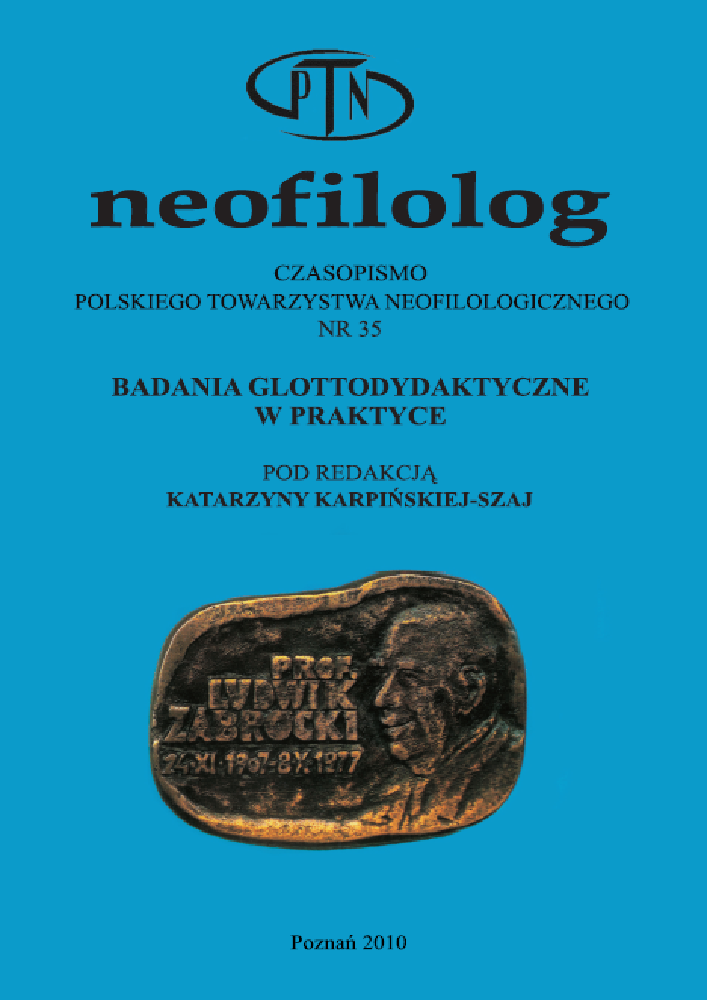Résumé
In traditional classrooms, where students are evaluated on the basis of their actions, poor performance is closely linked to the lack of ability. Many students often see failure as a threat to their positive self-image and instead of increasing efforts, apply various ego-protective strategies to shift attention from real or hypothesized lack of ability to other factors influencing unsatisfactory production. In both cases self-worth is protected. This paper aims at performing a motivational analysis of two such strategies, i.e. self-handicapping and defensive pessimism used by secondary school students in achievement context.
Références
Berglas, S. i E.E. Jones. 1978. „Drug Choice as Self-Handicapping Strategy in Response to Success.” Journal of Personality and Social Psychology 36: 405-417.
Buss, D.M. i N. Cantor (red.). 1989. „Personality Psychology: Recent Trends and Emerging Directions”. New York: Springer-Verlag. 115-127
Covington, M. 1992. Making the grade. New York: Cambridge University Press.
Dweck, C.S. 1986. „Motivational processes affecting learning.” American Psychologist 41: 1040-1048.
Elliot, A.J. i M.A. Church. 2003. „A Motivational Analysis of Defensive Pessimism and Self-Handicapping.” Journal of Personality 71: 369-396.
Feick, D.L. i F. Rhodewalt. 1997. „The double-edged sword of self-handicapping: Discounting, augmentation, and the protection and enhancement of self-esteem.” Motivation and Emotion, 21: 147-163.
Jones, E.E. i F. Rhodewalt. 1982. The Self-Handicapping Scale. Princeton University.
Martin, A., H., Marsh, i R. Debus. 2001. „Self-handicapping and defensive pessimism: Exploring a model of predictors and outcomes from a self-protection perspective.” Journal of Educational Psychology, 93: 87-102.
Martin, A.J., H.W. Marsh, A. Williamson i R.L. Debus. 2003. „Self-handicapping, defensive pessimism, and goal orientation: A qualitative study of university students.” Journal of Educational Psychology 95: 617-628.
Norem, J.K. i N. Cantor. 1986. „Defensive pessimism: Harnessing anxiety as motivation.” Journal of Personality and Social Psychology 51: 1208-1217.
Norem, J.K. i K.S.S. Illingworth. 1993. „Strategy-dependent effects of reflecting on self and tasks: Some implications of optimism and defensive pessimism.” Journal of Personality and Social Psychology 65: 822-835.
Norem, J.K. 2001. „Defensive pessimism, optimism, and pessimism.” (w) Optimism & pessimism: Implications for theory, research, and practice. (red.) E.C. Chang Washington: American Psychological Association.
Showers, C. 1992. „The motivational and emotional consequences of considering positive or negative possibilities for an upcoming event.” Journal of Personality and Social Psychology, 63: 474-483.
Shepperd, J. i R. Arkin. 1998. „Determinants of self-handicapping: Task importance and effects of pre-existing handicaps on self-generated handicaps.” Personality and Social Psychology Bulletin, 15: 101-112.
Snyder, C.R., T.W. Smith, R.W. Augelli i R.E. Ingram. 1985. „On the self-serving function of social anxiety: Shyness as a self-handicapping strategy.” Journal of Personality and Social Psychology, 48: 970-980.
Urdan, T. i C. Midgley. 2001. „Academic self-handicapping: What we know, what more there is to learn.” Educational Psychology Review, 13: 115-138.
Licence
© Aleksandra Więckowska 2010

Ce travail est disponible sous licence Creative Commons Attribution - Pas de Modification 4.0 International.
Auteurs :
Les auteurs de textes acceptés pour publication dans la revue Neofilolog sont tenus de remplir, signer et renvoyer à l'adresse de la rédaction, un accord sur l'octroi d'une licence gratuite pour les œuvres, avec obligation d'accorder une sous-licence CC.
En vertu de cet accord, les auteurs des textes publiés dans la revue Neofilolog accordent à l'Université Adam Mickiewicz de Poznań une licence non exclusive et gratuite et permettent l'utilisation de la sous-licence Creative Commons Attribution-NoDerivatives 4.0 International (CC BY-ND 4.0).
Les auteurs se réservent le droit de disposer librement de l'œuvre.
Utilisateurs :
Les utilisateurs d'Internet intéressés ont le droit d'utiliser les œuvres publiées à partir de l'année 2017 sous réserve des conditions suivantes :
- reconnaissance de la qualité d'auteur - l'obligation de fournir des informations sur la qualité d'auteur, le titre, la source (liens vers l'œuvre originale, DOI) et la licence, ainsi que l'œuvre distribuée ;
- sans créer d'œuvres dérivées - l'œuvre doit être conservée dans sa forme originale, p. ex. les traductions ou les interprétations ne peuvent être distribuées sans le consentement de l'auteur.
Tous les textes publiés sont soumis au droit d'auteur.
Autres :
L'Université Adam Mickiewicz de Poznań se réserve le droit à la revue dans son ensemble (mise en page, forme graphique, titre, conception de la couverture, logo, etc.).
.
